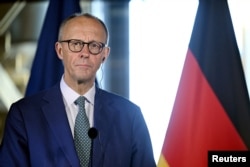Remarks by German Chancellor Friedrich Merz on allowing Ukraine to fire Western-supplied missiles at military targets deep inside Russia have rekindled debate about supplying Taurus cruise missiles to Kyiv amid a visit to Berlin by Ukrainian President Volodymyr Zelenskyy on May 28.
Ukraine has long requested the German-Swedish weapons system, which can deliver a heavy payload with high precision on targets some 500 kilometers away.
Germany is the second-largest supplier of military aid to Ukraine after the United States. Yet Merz's predecessor, Olaf Scholz, declined to supply Taurus missiles amid Kremlin threats that it would make Berlin a party to the war.
"German dithering under Scholz handed Russia an operational advantage and allowed them to adapt their defenses and tactics," John Foreman, a former British military attache in Moscow and Kyiv, told RFE/RL.
"Adding belatedly another string to Ukraine's bow would be good. But I'm unconvinced it will change the trajectory of the war," he added.
What Long-Range Missiles Does Ukraine Have?
Since Russia's full-scale invasion of Ukraine in 2022, Western countries have provided Kyiv with a variety of weapons capable of hitting targets far behind Russian lines.
The United Kingdom and France have supplied Storm Shadow/Scalp cruise missiles, which have a range of about 250 kilometers, while Washington has sent its Army Tactical Missile System (ATACMS) with a range of some 300 kilometers.
These weapons were originally supplied with the proviso that they would only be used on targets in Russian-occupied Ukrainian territory.
But in November last year then-President Joe Biden's administration said Ukraine could use ATACMS in Russia's Kursk region, where its forces were fighting to hold a small chunk of Russian territory.
Shortly afterward there were reported uses of Storm Shadow/Scalp within Russia. Merz now appears to have commented on these developments.
"The countries that imposed range restrictions have long since abandoned these conditions," he said on May 27.
"Ukraine has the right to use the weapons it receives -- including to use them beyond its own national borders against military targets on Russian territory."
The remarks clarified a statement during a TV interview the previous day, which implied that this was a new policy as well as sparking renewed speculation about Germany supplying Ukraine with Taurus missiles.
"The main issue is that our partners provide us with the means to strike, both Scalps and the German Taurus. If they do it will help us quite a bit," Ukrainian lawmaker Roman Kostenko told RFE/RL's Ukrainian Service.
Roman Svitan, a Ukrainian military analyst, took a similar line in comments to RFE/RL's Russian Service.
"First, one should provide those missiles and then grant permission to use them wherever. Ukraine has no such Western missiles left. We have nothing to fire," he said.
Not A Game-Changer
Foreman, the UK military attache, warned that the Taurus system would not be a game-changer.
"Russia has adapted considerably over the last three years, in particular by dispersing its forces, changing its tactics, and improving its kinetic and nonkinetic defenses," he said.
"These steps have reduced (but not removed) vulnerability to Ukrainian missile strikes in the Russian rear areas…. A few missile strikes by Taurus won't affect this dramatically."
Still, getting an announcement could boost Ukrainian morale and would give Zelenskyy a political victory. Merz's comments drew a negative response from Moscow.
"These potential decisions, if they have been made, are completely at odds with our aspirations for a political settlement," Kremlin spokesman Dmitry Peskov said.
These are "quite dangerous decisions," he added.
There was no immediate official response from London, Paris, or Washington, a silence that aligns with a strategy Berlin has dubbed "strategic ambiguity." Broadly speaking, it means not telegraphing military strategy to Moscow. And it's something of a departure for Merz.
Merz's Changing Views On Taurus
Merz views on Taurus have changed over time. While in opposition, he fiercely criticized what he saw as the German government's timidity over support for Ukraine -– and demanded openness on military supplies.
In November 2023, he submitted a motion in parliament calling for "finally, without delay, satisfying the Ukrainian request for Taurus cruise missiles." The motion was defeated.
By October last year, Merz's position had morphed. In a parliamentary debate, he said the government should give Moscow an ultimatum: either stop attacking civilian targets in Ukraine, or Germany will supply the Taurus.
In his comments on May 26, he did not mention Taurus but may have hinted at it.
"We will do everything we can to support Ukraine. This means no more range restrictions for weapons we supply," he wrote on social media.
Yet he may not be speaking about Taurus missiles. Germany has also provided Ukraine with Mars II rocket launchers, which have a range of some 85 kilometers.
There are obvious military reasons for "strategic ambiguity" but also political ones. Merz's coalition partners, the Social Democrats, have opposed supplying Taurus, and opinion polls show it is deeply unpopular with the German public.
It has been suggested that, for this reason, Merz is no longer so keen on the idea and may now be inclined to instead help Ukraine develop its own long-range capabilities.
In any case, it could be that the first the world hears about Taurus missiles being supplied to Ukraine will be if and when they are fired.















